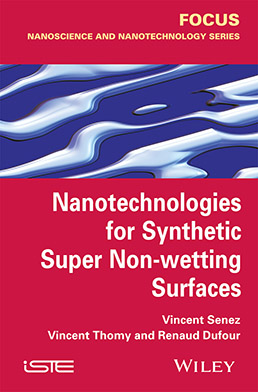
This book explores the state of the art concerning the development and use of micro-/nanotechnologies for the design of synthetic liquid-repellent surfaces, with a particular focus on super-oleophobic materials. It proposes a comprehensive understanding of the physical mechanisms involved in the wetting of these surfaces, and reviews emerging applications in various fields such as lab-on-chip, self-assembly or biology. It also highlights the current limitations and challenges which are yet to be overcome.
As such, this book is particularly suited to researchers, engineers and students interested in micro- and nanotechnologies dedicated to wetting phenomena (repellency, drag reduction, biofouling, lab-on-a-chip, displays, self-assembly, biosensing, biology, petrol extraction, and so on).
1. Nanotechnologies for Synthetic Super Non-wetting Surfaces.
2. Wetting on Heterogeneous Surfaces.
3. Engineering Super Non-wetting Materials.
4. Fabrication of Synthetic Super Non-wetting Surfaces.
5. Characterization Techniques for Super Non-wetting Surfaces.
6. Emerging Applications.
Vincent Senez is Head of the Microtechnologies and Microsystems Department at the Institute of Electronics, Microelectronics and Nanotechnologies, University of Lille, France. His current areas of interest cover liquid-surface interactions, droplet-based microfluidics and electrical biosensors for real-time, label-free monitoring of bio-cellular systems.
Vincent Thomy is Assistant Professor in the BioMEMS group at the Institute of Electronics, Microelectronics and Nanotechnologies, University of Lille, France. His research is focused on electrowetting-based digital microfluidic microsystems, the interaction of liquid micro-droplets with textured surfaces, and the design and fabrication of bio-microsystems for in-vitro analysis (point-of-care diagnostics applications).
Renaud Dufour is a Post-doctoral Fellow at the Max-Planck Institute for Dynamics and Self-Organization in Göttingen, Germany. His research is focused on the development of liquid-repellent super-oleophobic surfaces and the characterization of wetting phenomena.